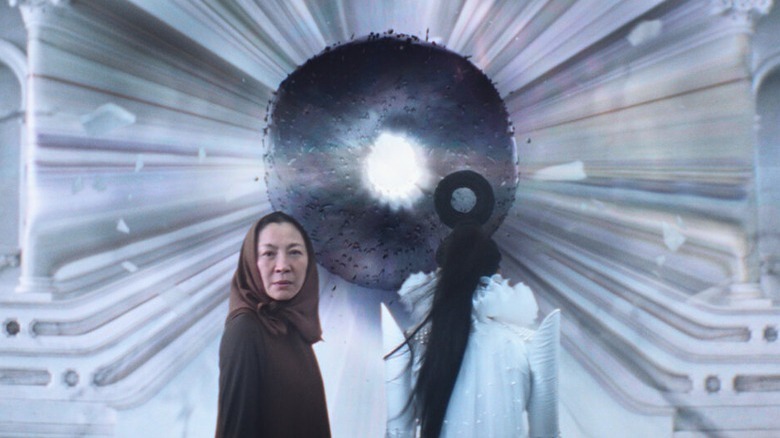
The epic journey of "Everything Everywhere All At Once" may span the entire multiverse, but despite its fantastical, kaleidoscopic lens, the core theme of the film's story is about dealing with the cold, isolating effects of nihilism. Directors and screenwriters Daniel Kwan and Daniel Scheinert had been working on the concept for more than a decade, so the script went through numerous changes in the years leading up to its production. According to producer Jonathan Wang, though, Daniels (as they're collectively known) were always invested in delving into the emotional conflict that results from trying to find meaning in a meaningless multiverse.
A year after its theatrical debut, "Everything Everywhere All At Once" has emerged as one of the most financially and critically successful independent films in recent times. That's probably because it feels so relatable to modern filmgoers, capturing the paradoxical sense of sensory overload and ennui resulting from an interconnected digital world. Psychiatrist George Gillett, writing for The Lead, compares the sensation of browsing the web with traveling the multiverse and points out that although "the Internet is alluring [...] it can also be profoundly disorientating, rife for nihilism and passivity." Just as the Internet may make us feel minuscule in the grand scheme of things, an infinite number of universes in which anything can happen means that nothing truly matters.
The Whole Of The Bagel

Such is the mantra of the film's antagonist, Jobu Topaki, who creates an "Everything Bagel" singularity that is quite literally a black hole of despair that can swallow the entire multiverse. In an interview with Vulture, Daniel Scheinert expressed that it was "a useful, simple symbol that we could point to as filmmakers," a device that could articulate the philosophy of nihilism "without being too eye-rolly," as Daniel Kwan elaborated. Ironically, the emptiness of the bagel hole served as a solid center of the script, bridging the gap between the film's sci-fi action and its emotional punches.
Jobu's ability to experiences all universes at once sounds a lot like people who struggle with the onslaught of information online and social media posts, especially because she represents a younger generation. The film proposes that the key to avoiding the depression that results from verse-hopping is remembering and savoring personal relationships, an explanation that also seems to apply in the struggle between living in the grounded present and existing in the digital realm.
Everything Or Nothing

It was important that "Everything Everywhere All At Once" had a clear underlying philosophy so that the audience didn't become just as numb to all the multiverse chaos as Jobu does. Daniels said that as much as the Everything Bagel concept is a joke, it also conveys the film's message. Jonathan Wang explained to IndieWire that "being funny helps unlock something deeper," but "if it's wackiness for wackiness' sake, we actually hate it." That's why it was so important to for the story to keep circling back to the nihilism theme throughout all the hot dog fingers and Raccacoonies. There needed to be some sort of way to work out the confounding equation of meaninglessness.
Here's how Wang described it:
"We currently live in a world where it's either nihilism and despair or fundamentalism. [...] You're entrenched in your dogmas. You've become [a] conspiracy theorist. How do we bring these two things together? It's active love — the idea that, no matter what universe you're in, I will always want to be here with you. Maybe that's not the solution but it states the problem."
In other words, "Everything Everywhere All At Once" is ultimately about fighting through the overstimulation of the multiverse to find sympathy and emotional connection with others. It's a key concept that had to be the script's focus point as the story goes through its own verse-hopping changes.
Read this next: The 20 Most Important LGBTQ+ Directors
The post Everything Everywhere All At Once's Nihilism Was The Core Of Daniels' Script appeared first on /Film.
0 Comments